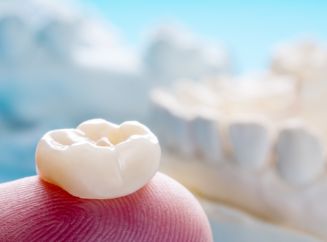Crowns

The Problem:
The Solution: Dental Crowns
A crown (often called a cap) acts like a helmet and covers the tooth and restores it to its original shape and size. Decay is removed and cleaned from the tooth and a highly accurate impression or mold is made of the prepared surface. This mold is used to create a model of the tooth which is then sent to a special laboratory that will create a gold or porcelain (tooth colored) crown. The crown is then cemented onto the prepared surface of the tooth.
What are the advantages of dental crowns?
Crowns are incredibly strong due to the fact that they are created in a laboratory. This protects and strengthens the remaining tooth structure. In the hands of a skilled dentist, a crown will fit almost perfectly onto the prepared surface of the tooth, reducing the size of the seam between the crown and the tooth. This helps keep decay from eventually occurring under the crown.
Crowns should be placed before the tooth is so decayed that it may fracture. This can often help prevent the expense of root canal therapy in the future. It can also prevent the possibility that a fractured tooth may need to be removed, requiring the expense of a bridge or dental implant to replace the missing tooth.
What are the disadvantages of dental crowns?
Crowns are excellent restorations and have few disadvantages. They are highly durable, but they may eventually need to be re-cemented or replaced due to normal wear.
Occasionally, a tooth may still need root canal therapy after receiving a crown. However, this indicates that the interior of the tooth was already sick (infected) and would have eventually needed root canal therapy anyway.
What are the alternatives to dental crowns?
In the event that a tooth is so decayed or fractured that it needs to be removed, the best alternatives to a crown are bridges and dental implants that replace the missing tooth.
What are dental crowns made of?
There are many types of materials used to make dental crowns. They include:
| Ceramic (porcelain) – tooth-colored |
Zirconia (solid or layered with porcelain) – tooth-colored |
Lithium Disilicate (E-max®) – tooth-colored |
| Gold alloys – gold colored |
Base metal alloys – silver colored |
Metal-ceramic* |
*(a metal coping is used on the inside lining for strength, and layered with ceramic) – tooth-colored

How long do crowns last?
While crowns can last a lifetime, they sometimes get loose or come off. The most important measure you can take to ensure the longevity of your crown is to practice good oral hygiene. If the teeth or bone that hold a crown are damaged by dental disease, the crown will lose support. Keep your gums and teeth healthy by brushing with a fluoride toothpaste at least twice a day, using dental floss and mouthwash daily. Also, consult the dentist and hygienist periodically for dental checkups and cleanings.
To prevent damage to your new crown, avoid chewing on hard foods, ice, or other hard objects.
Who is a candidate for dental crowns?
To recommend a dental crown, our Pasadena dentist relies on the following factors that can occur in the patient's mouth:
Weak and extensively compromised tooth
Fracture of a tooth
Severe tooth wear
Poor resistance of the enamel structure
Lack of a tooth
Need for improving the appearance of the mouth
Following the completion of root canal therapy (endodontic treatment)
The need to cover a dental implant
How many appointments do I need for a dental crown?
The procedure of installing a dental crown is usually accomplished in two dental visits. During your first appointment, the dentist will examine the tooth to make sure it can support a crown, and then will prepare it for the crown. A highly skilled dental lab will then make the final crown, which will be cemented to the tooth a few weeks after the first visit.
Related Articles About Dental Crowns
← Back to Cosmetic Dentistry